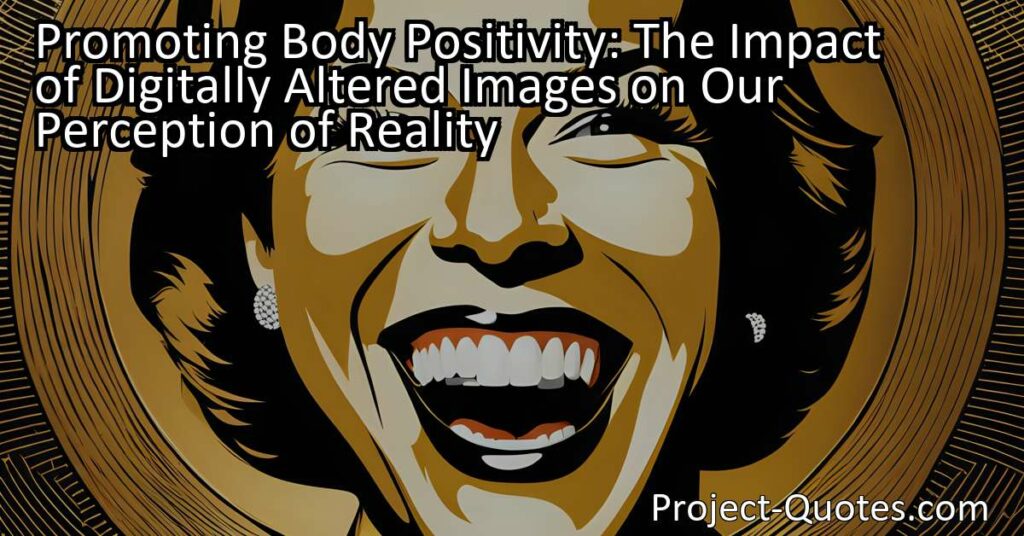Keep in mind that there are computers, that do touch things up. Like when I got a hold of the poster for ‘Gold Diggers,’ I said: ‘Hey, wait a minute! Those aren’t my teeth!’
Anna Chlumsky
In recent years, there has been a growing movement towards promoting body positivity and embracing natural beauty. Many celebrities and influencers have taken a stand against excessive photo editing, using their platforms to advocate for more realistic portrayals of individuals in the media. This is a step in the right direction, as it encourages authenticity and self-acceptance, rather than promoting unattainable ideals.
Table of Contents
- 1 Keep in mind that there are computers, that do touch things up. Like when I got a hold of the poster for ‘Gold Diggers,’ I said: ‘Hey, wait a minute! Those aren’t my teeth!’
- 2 Anna Chlumsky
- 3 Meaning of Quote – Keep in mind that there are computers, that do touch things up. Like when I got a hold of the poster for ‘Gold Diggers,’ I said: ‘Hey, wait a minute! Those aren’t my teeth!’
- 4 Freely Shareable Quote Image
- 5 Related
Meaning of Quote – Keep in mind that there are computers, that do touch things up. Like when I got a hold of the poster for ‘Gold Diggers,’ I said: ‘Hey, wait a minute! Those aren’t my teeth!’
Have you ever looked at a photograph and wondered if it accurately represents reality? Well, you’re not alone. In fact, even celebrities like Anna Chlumsky have discovered that technology can sometimes alter our perception of what is real.
In a world dominated by digital media, it’s no surprise that technology has found its way into the realm of photography. From professional photo shoots to casual snapshots, it seems like there’s always a way to enhance or manipulate an image. But what happens when these modifications go too far?
Anna Chlumsky, an actress known for her role in the TV series “Veep,” once encountered this very situation when she discovered that her own teeth had been digitally altered in a movie poster. She recounts the incident by saying, “Keep in mind that there are computers, that do touch things up. Like when I got a hold of the poster for ‘Gold Diggers,’ I said: ‘Hey, wait a minute! Those aren’t my teeth!'”
This incident raises some important questions about the influence of technology on our perception of reality. With the advancements in photo editing software, it has become easier than ever to manipulate images in order to fit a certain ideal. Whether it’s airbrushing away imperfections or altering physical features, we find ourselves constantly bombarded with flawless images that may not accurately represent the person or the situation being depicted.
On one hand, the use of digital touch-ups can be seen as a harmless way to enhance the overall aesthetic of an image. After all, who doesn’t want to look their best in a photograph? However, when these modifications start to distort the truth and create unrealistic expectations, we enter a dangerous territory where authenticity and self-acceptance are compromised.
In Chlumsky’s case, her teeth were digitally altered without her consent, resulting in a poster that did not accurately represent her appearance. This incident shines a light on the importance of respecting an individual’s natural features and not succumbing to societal pressures of perfection. It serves as a reminder that even celebrities, who are often idolized for their beauty, can fall victim to the unrealistic standards perpetuated by photo editing.
Furthermore, this incident highlights the need for greater transparency in the media. When we’re constantly exposed to digitally manipulated images, it becomes increasingly difficult to differentiate between what is real and what is fabricated. This has the potential to contribute to a distorted sense of self-image and can have negative effects on individuals, especially teenagers who are particularly vulnerable to societal pressures and beauty standards.
In recent years, there has been a growing movement towards promoting body positivity and embracing natural beauty. Many celebrities and influencers have taken a stand against excessive photo editing, using their platforms to advocate for more realistic portrayals of individuals in the media. This is a step in the right direction, as it encourages authenticity and self-acceptance, rather than promoting unattainable ideals.
It’s important for us, as consumers of media, to be aware of the impact that digitally altered images can have on our perception of beauty. We should approach these images with a critical eye and challenge the notion that perfection is the ultimate goal. Instead, let’s celebrate diversity and embrace the unique qualities that make each of us beautiful in our own way.
In conclusion, Anna Chlumsky’s experience with the digitally altered movie poster serves as a reminder of the power and potential dangers of technology in shaping our perception of reality. It highlights the importance of being critical consumers of media and advocating for realistic portrayals of individuals. By embracing authenticity and celebrating diversity, we can foster a culture that values and appreciates the beauty in all of us.
I hope this quote inspired image brings you hope and peace. Share it with someone who needs it today!


